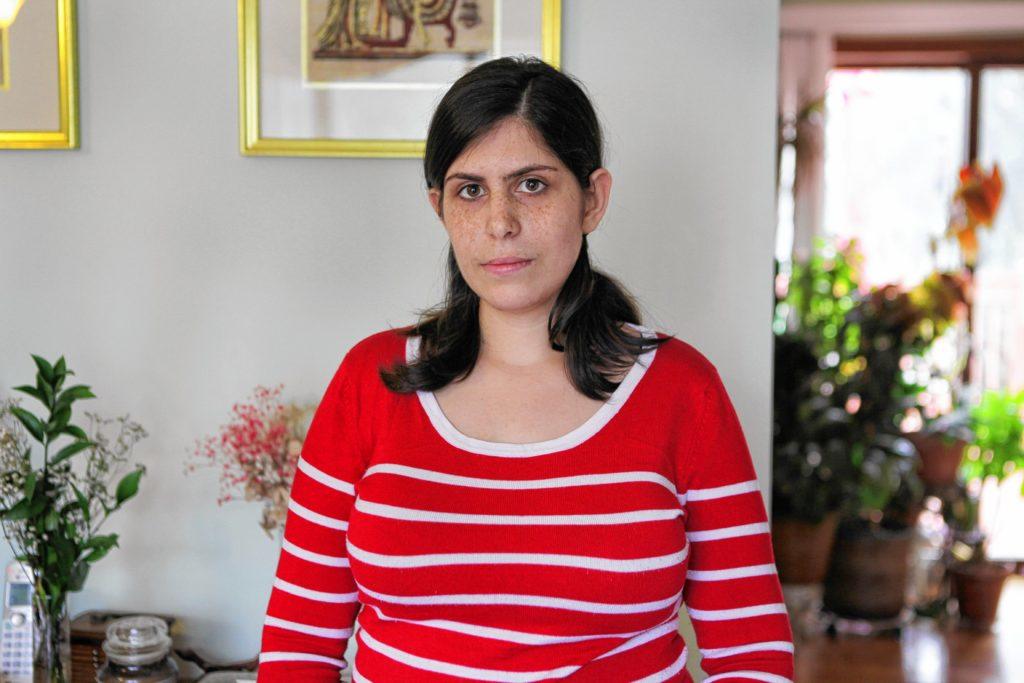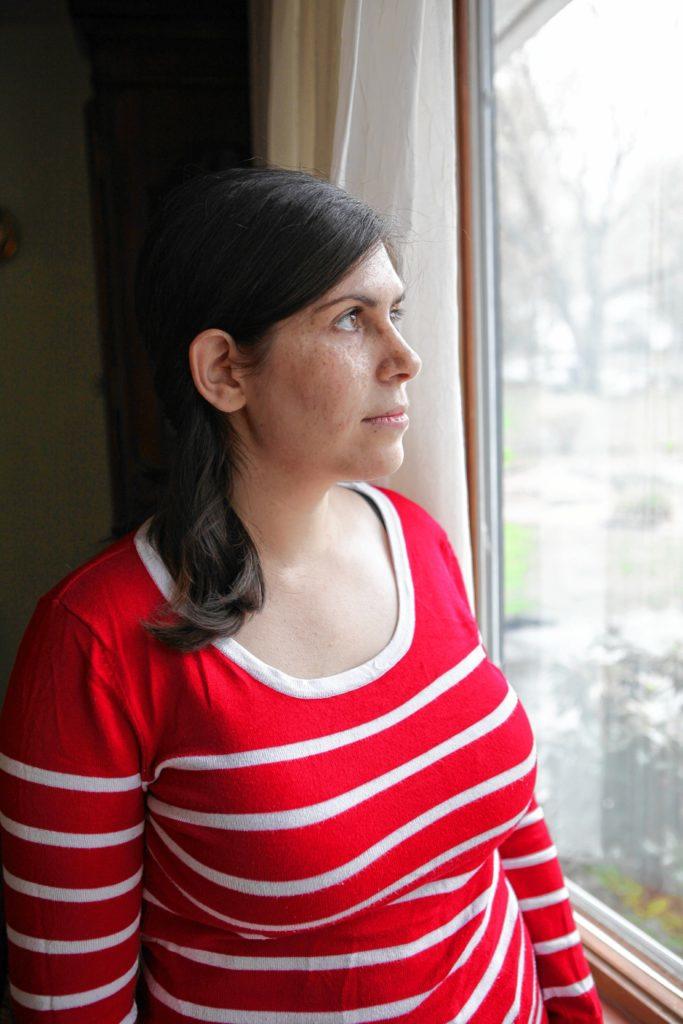Editor’s Note: This week, we are delighted to collaborate with Jenny Bender and Amanda Herman, two active community members (one writer, one photographer) who set out this past year to do a citizens’ oral history project on our Muslim friends and neighbors. This article features several stories from the series, which Bender and Herman treat as an ongoing project and look forward to sharing and exhibiting in the coming months. — Hunter Styles
For six months, Amanda Herman and I photographed and interviewed Muslims in Amherst, Northampton and Springfield. We asked participants four central questions: What is most important to you about your faith? What is your understanding of the role of women in Islam? What is it like for you to be a Muslim in America today? And lastly: what would you like non-Muslims to know about your religion?
The responses of the Muslim men, women and children with whom we spoke offer a stark counterpoint to the distorted media coverage of Muslims today.
Our hope was that this project would help stir compassion and understanding in others. For me, one of the unexpected gifts is that my compassion and understanding has been stirred. Not for Muslims — that kind of compassion is easy for me. My struggle is compassion for those who hold values that conflict with my own.
My new hope is that the incredible wave of mobilization rising and spreading across the world will be fueled not by rage but by empathy. I am not suggesting that we shouldn’t be angry or afraid. I am suggesting that we can choose what energy we feed and grow. I urge us to put our arguments aside, even temporarily, and truly listen. To search for answers to questions like: “Why is this person, like me, so angry and afraid and self-righteous?” And: “Where is this person’s humanity, that makes him or her less ‘other’ and more familiar?”
During Ramadan this past year, I was invited to a gathering to break the daily fast. After several wonderful hours with mostly strangers, my ten-year-old son Harrison said, “That was great. I learned so much.” And then he said, “I was a little uncomfortable at first, probably because I’m not used to being around so many Muslims or people who look different than me. I think that’s my internal [sic] racism.” Writing it now, my heart catches. How can this ten-year-old child be so wise while our “leaders” are leading us so very astray?
“I want to get over that,” Harrison continued. “I think the way to do that is to spend more time with people who are different than me.”
I am reminded of when Naz, a woman we interviewed, said: “I think the most important thing for non-Muslims to do is to make friends with a Muslim.”
Dr. Martin Luther King, Jr. said: “People fail to get along because they fear each other; they fear each other because they don’t know each other; they don’t know each other because they have not communicated with each other.”
What other hope do we have but to connect, human to human? — Jenny Bender
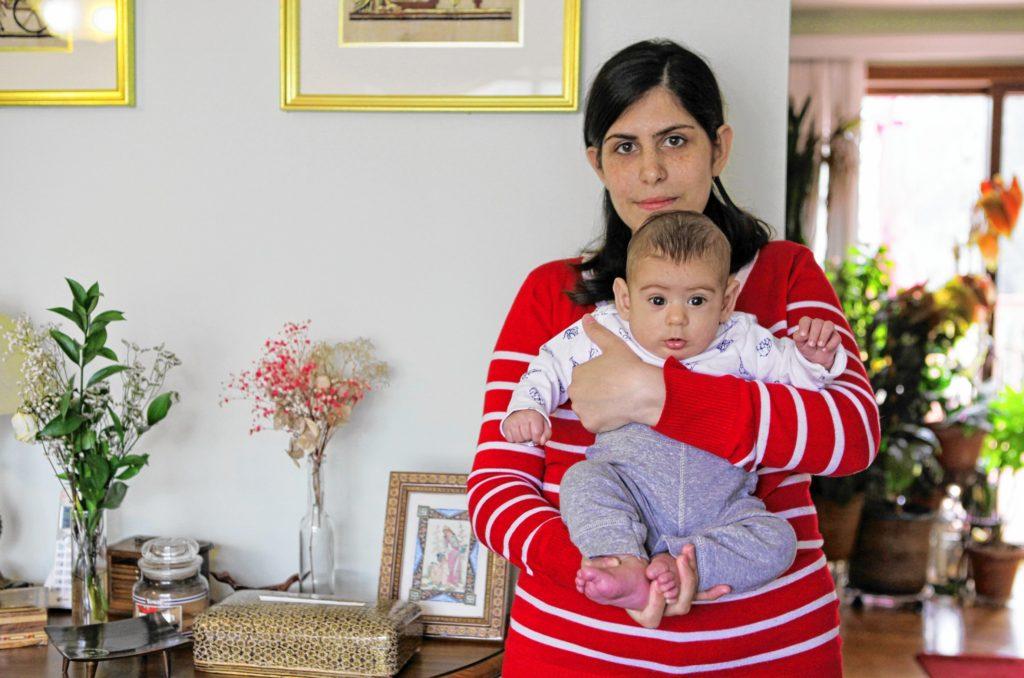
Amherst resident Rama Adi. Amanda Herman photo
Rama Adi fled from Syria to Iraq in 2013. In September 2015, she came to visit her aunt in Amherst. Because she was pregnant, and because Iraq had become so dangerous, her husband advised her to stay in the United States. He has since been denied a visa to join his wife and his son, whom he has only met through Skype.
I believe in Allah. Islam, like any other religion from God, has criteria like honesty. Not to kill, not to rape, not to steal. The importance of family, even the bigger family — not just parents, also aunts, uncles, grandparents. Not to cheat, not to lie. Criteria that every human should live.
Faith helps me work hard. It prevents me from lying. It helps in our revolution. We have something in Islam, if you see something bad and you say nothing, you’re involved. You have to say, “It’s not right. You have to stop.” Me and my husband were involved in the revolution, that’s why we fled Syria. We participated in the demonstrations. We had bad regime, bad president. The past years, before leaving, we knew it was bad. But no one had the courage to say something about it. But when the killing started, we had to do something. We couldn’t just watch what was happening. We had to do right. Everything right we do is related to Islam. It’s not like Isis or Al-Qaeda. They have nothing related to Islam.
Here (in Amherst) I didn’t have a hard time to adjust. I don’t wear hijab, so people don’t even know I’m Muslim. So I didn’t have any situation with people being rude to me. This town is sort of progressive. I have friends in other states. Like in Syracuse, my friend told me someone spit on him because they thought he was Muslim.
I’d like non-Muslims to know about Islam — all the good in it, about the good in Muslims. Muslims who do instructions, who wear hijab, they are good people. They are really hard workers. They are good to their families. They have normal lives. Like any other religion, Islam has instructions. But they will not harm anyone. Some people think Muslims think the other religions are not okay. That’s not true. Religion is from God, so we believe in other religions. Our Allah is the same God for all religion, it’s just the Arabic name for it. Islam is never, never, never about killing. This idea that Al Queda is trying to say that if you kill you’re going to heaven—no! If you kill, you aren’t going to heaven.
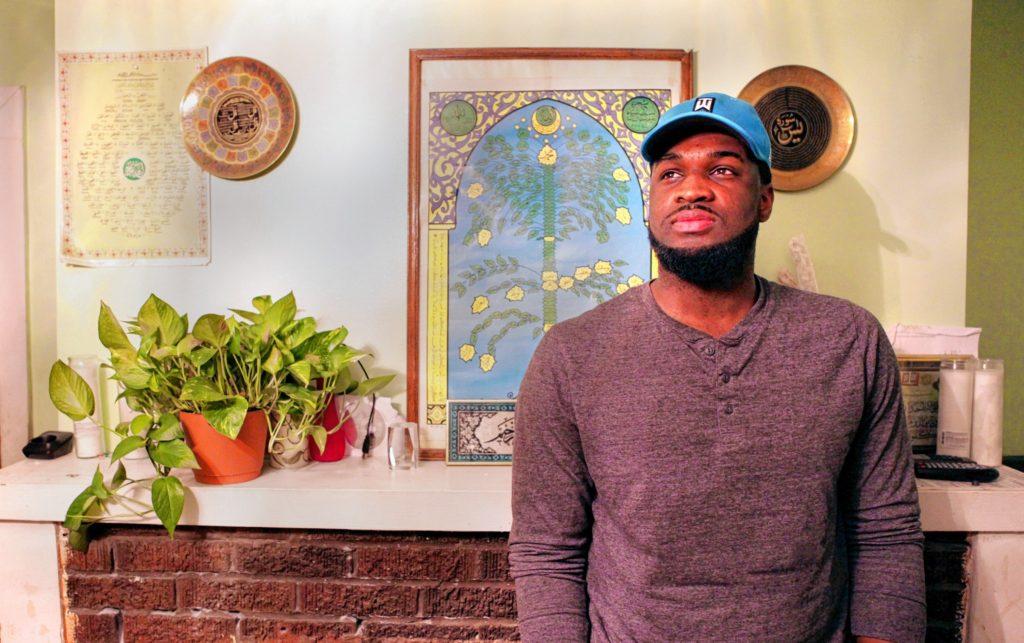
M. K. Bey, Worcester resident and Springfield native. Amanda Herman photo
M.K. Bey was born and raised in Springfield. He currently attends Assumption College in Worcester.
Being Muslim means everything to me. Its guidelines are the way we live life. Praying five times a day. How we’re supposed to conduct ourselves. Understanding that God is always watching. Really honing in on your inner self and doing the right thing. I think that’s the biggest component of being a Muslim, following Islam and what those principles are: Be good to your neighbor. Don’t do something that you wouldn’t want for yourself. Do unto your brother as you would do unto yourself. It doesn’t just affect Muslims. It affects all of mankind, people who practice whatever faith they may practice. I feel like it’s universal code. The golden rule.
What’s going on right now politically is creating an environment that fosters hostility toward Muslims. It’s unwarranted, because it’s just people practicing their religion. Islam means peace. I don’t think it’s fair to make a generalization about what the media is propagating. Just from a mathematical perspective, there are about 1.5 billion Muslims. Not even 1% represents those extremists that we see on TV. Do your own research. Don’t just take what you hear and travel with it. Seek knowledge from the cradle to the grave. That’s another mantra that Muslims stand by. A lot of issues going on in today’s country would be clarified if people had just a little more understanding of what Islam really means. Do yourself some justice, and try to understand what Islam stands for.
Understanding history, each kind of foreign group of people go through those tests, whether it be the Jews, the Irish, the Italians coming to America. It’s this fear of what you don’t know. It’s our time. We’re going through that rough patch. Sooner or later it’s going to blow over. But right now, we’re maintaining. I feel like women have it tougher because of their dress code. I haven’t endured any of the struggles that my parents, my aunts, my sisters, my mother, my female cousins have.
Those people who are oppressing women, I wouldn’t say that they’re Muslim. The same way that Christians wouldn’t say that the Ku Klux Klan is Christian. I wouldn’t consider them to be devout. I wouldn’t consider them to be my Muslim brothers and sisters. I wouldn’t say that we share anything in common. I don’t think there’s a correlation between the way that they practice and the way that we practice. To oppress women, to oppress men — no, that’s not something that we practice. That’s not something that’s even found in the Qur’an. It’s people who have their own agenda, and they’re trying to exploit something. But no, that doesn’t stand for Islam and what real Muslims follow.
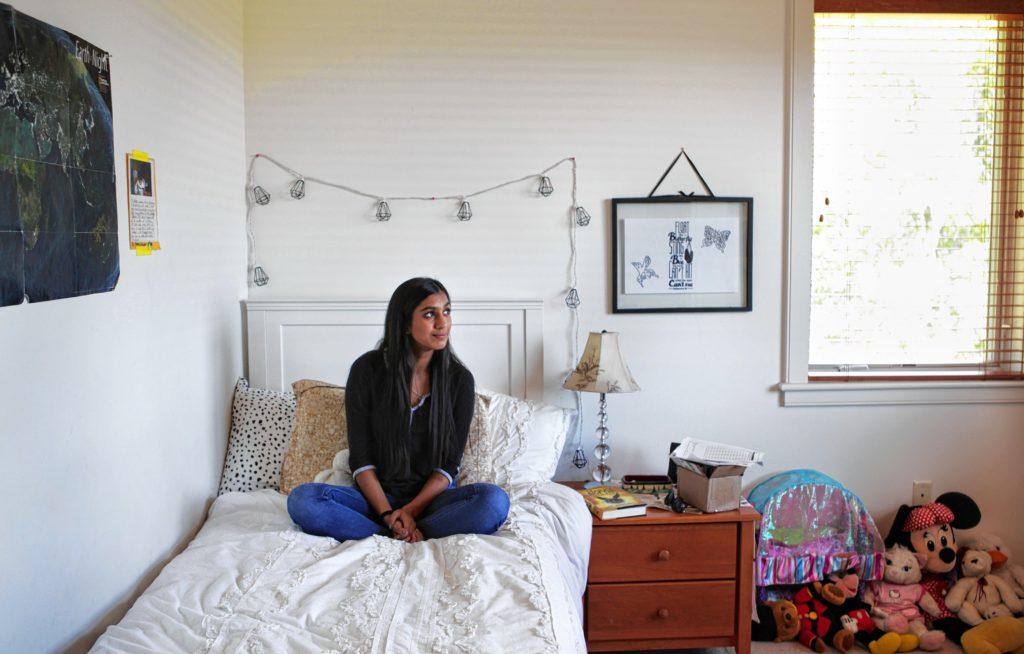
Amherst resident Maha Awaisi, in her bedroom. Amanda Herman photo
Maha Awaisi was born and raised in Amherst by her Pakistani-born mother and father. She is currently a senior at Amherst High School, where she started an anti-Islamophobia campaign with a non-Muslim friend.
The only time I felt anxiety about being a Muslim is during school. When I got older and the topic of Islam would come up in class, I would feel nervous. My heart would beat really fast. It was the fear of someone saying something, whether that was something racist or something that just made me uncomfortable. But if people ever ask me, “Oh, are you Muslim?” I would never say no. Some of my peers that were Muslim would deny it. That was definitely hard. There were other times in school when I’ve heard remarks. But you have to pick your battles.
I feel like I’ve gained some support to deal with Islamophobia. A non-Muslim friend said to me, “We never talk about Islamophobia in Amherst or in the Pioneer Valley.” But there are pockets of it. So we’ve created an anti-Islamophobia campaign in our school. I’ve put myself out there as, “Hey, I’m an American. I’m a Muslim.” This is how my peers see me. It’s more comforting that way.
If you wanted to know more about Islam, meet a Muslim. Or go to a mosque and visit and ask questions. The media right now is very focused on ISIS using Quranic verses to justify what they’re doing. But there’s so much of the Qur’an that’s contextual. You have to know what was going on. There’s so much complexity in it.
Often, when people think of the oppression of Muslim women, they think about the hijab and head covering. In the Qur’an, it says to cover your adornments. That can be interpreted in many different ways. That can be your hair or any part of you. It really is your own choice. The hijab is one way to do that. It’s one way to express your faith and to be modest. For many Muslim women, the hijab is actually so other people look at them more for their personality. So they think more about the inside than focusing right away on how women look on the outside. A lot of people don’t wear it just to cover their head. They wear it as a symbol and as part of themselves.
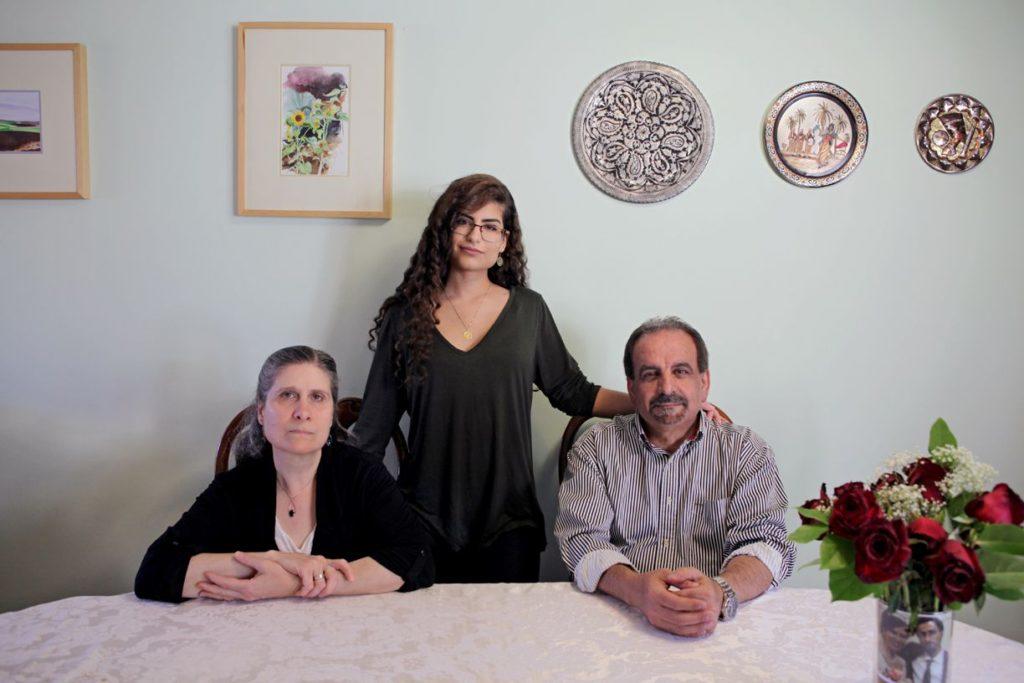
Abed Jaradet (right). and his family. Amanda Herman photo
Abed Jaradet left Palestine thirty years ago to attend graduate school at University of Massachusetts. He lives in Amherst with his wife and daughter. (His son now lives in California.) Abed supervises students at UMass.
Being Muslim is your spirit. It’s part of who you are. Christianity never really accepted Islam. Judaism really never accepted Christianity or Islam. Islam accepted both. Islam said, “These are the people of The Book, and they have rights, within the Islamic faith.” So what do I take from Islam? The same thing I take from Christianity. Jesus Christ in the Quran is described so beautifully. His story and his mother’s story, Mary the Virgin. Islam says, “You cannot sleep when your neighbor is hungry or sick. You have to share.” There’s no difference between Islam and the charter of the United Nations now. If you have something to offer, you start with your own. You take care of your own self, your own household, the people around you, your neighborhood. If you don’t find anyone, you go to the next town, and so on and so forth. These are noble elements.
1500 years ago, the Quran came to the Arabs in Arabia and said you shouldn’t bury your daughter when she is alive. 1500 years ago, everybody was burying their daughters, around the globe. For this one to come and say that she has a soul, she is precious, the same way as your son, and you cannot do that—that was huge. Islam said women inherit. These are the things, and many, many more, that Islam came and urged people to do. It was revolutionary.
Everywhere women belonged to men. In the US, too, until it recently started to shake a little bit of the oppression. So it’s not related to Islam. But it’s easier for the Patriarchy to say, “Oh, Mohammed said… Oh, the Quran said… Oh, Jesus said.” It’s easier to justify, and then after awhile it becomes tradition, and people don’t question it.
With the word “Muslim,” you are boxed between terrorism and abusing your woman. That’s it. You’re boxed and put in the corner. And whatever they see in the media, that’s true. Therefore, when Trump says he wants to bar Muslims, people say, “Yes!” These are millions. That’s cultural, embedded, hidden stuff. I know that it’s there, but it’s coming out and part of me wants to say, “Well, let’s tear it up a little and see what happens.”
Every election, they bring Islam and Muslims to the front. And every time, it’s stronger than the time before. 2008 was a really big deal, because Obama is black. They didn’t want to say we don’t want a black president. So they said, we don’t want a Muslim president. A Muslim they can run with it, it’s okay. If you are strange, you are a Muslim. If you look different, you are a Muslim. If you are brown, you are Muslim. If you are not of the mainstream, you are Muslim. So what has changed in the United States, from who knows when until now? Not much.
Let’s meet as human to human. We’re better off like that. If you’re a Muslim, take the best out of Islam, and let’s meet on a human level. If you’re a Jew or a Hindu or whatever it is, take the best of your religion. Let’s meet and exchange these things. There is no religion, no philosophy on the face of earth that is perfect and complete. Wherever you have religion and culture, there’s a clash. Islam in Indonesia is not the same Islam in Pakistan. Islam in Jordan is not the same Islam as in South Africa. Therefore, take whatever is good for you and your situation and your people and do it. I’d rather be a human being, try to be, and do the right thing. Do I care where I learned it from? I really don’t. We all learn from each other. If it makes me a better human being, I will do it.
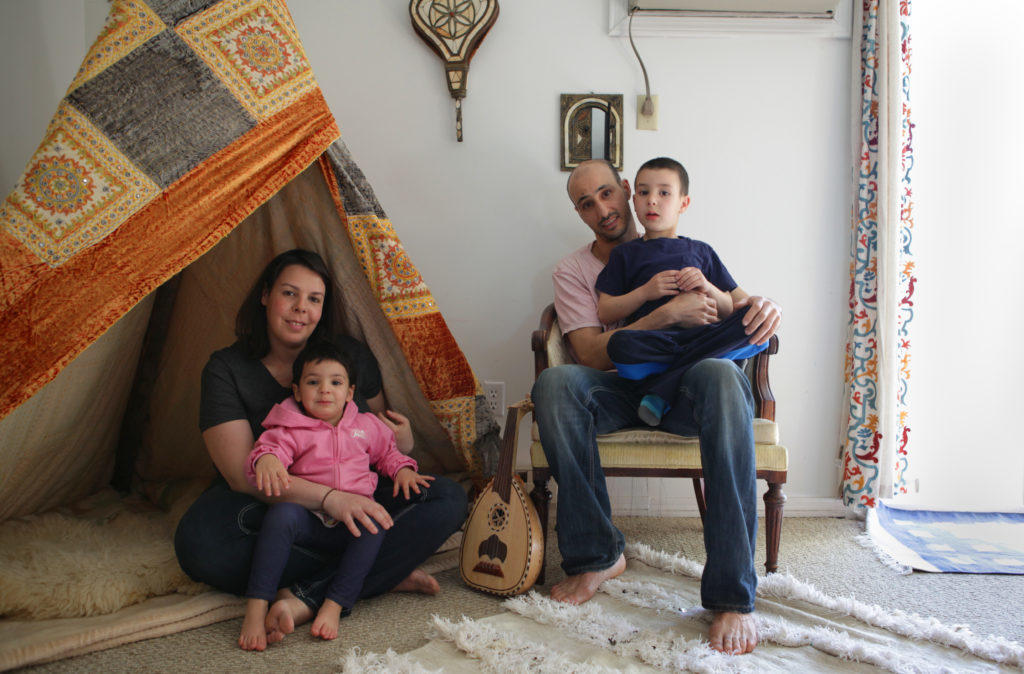
Northampton resident Adil Elkalai and his family. Amanda Herman photo
Adil Elkalai (on chair, with his son on his lap) left Casablanca in 1996 and moved to Boston where his older brother was living. He later married a Moroccan Muslim. They and their two young children moved to Northampton about seven years ago, because it seemed like a good place to raise a family.
I’d like non-Muslims to learn about the true religion. I was ignorant about my own religion. I lived it. But when I came to this country, I started studying it. I was like, “Woah, this is why we do this and this!” I started reading about the Prophet and how sensitive he was to his wives and to women. I was so mind-blown. That was how I started learning about my own religion. The Prophet was nice to Jews, to Christians. He was nice to poor. He was nice even to people who harmed him. I knew the Prophet, said his name everyday. But I had no idea he did all this stuff.
The more I learn, the more I’m intrigued and respectful, not only for my religion but other religions. It’s so deep and complicated, but also it’s simple. If I see you on the street, we can say, “Hi.” There is no religion that doesn’t allow you to say hi to some stranger. We can help each other. There is no rule in any religion that doesn’t allow you to help others. There is a verse in the Quran called “Al Catherine,” the non-believers. In the simplest word, it says, “You can follow your religion and let me follow mine. Don’t influence my religion, and I will not influence yours.” In other words, live your life, I’ll live my life, and we can still be friends.
Sometimes I come across people who are like, “Oh, your wife should wear hijab.” Or, “You should take your kids to the mosque, it’s obligatory.” But I listen to so many discussions and so many preachers, and most of them — the highly educated of them — say this religion is a really flexible religion. I feel like there is a separation unless you are educated. Education is my highest recommendation. The Prophet said, “I fear that my community will either get poor or ignorant.” If you’re poor, you could do so many bad things for money, which is what happens right now with ISIS. They go to these Syrian and French ghettos and give them thousands of dollars a month just to join. If I’m poor, and I’m living in a one bedroom apartment with five other brothers and sisters, and the government is suppressing us, and someone offers $2000 (that’s what my dad made the whole year!), I’m gonna go. For an ignorant person, you’re going to make bad decisions.
I hear people say, “I didn’t get this job because I’m dark skinned, and they assumed I’m Muslim.” I’ve been extremely lucky. But my wife and I are Muslim and probably we don’t look it. My wife is white. If she had blonde hair, you’d think she was American. She doesn’t wear the veil. Also, Amherst and Northampton is a very open area. We feel very, very comfortable. But I’ve been to other towns in Boston where I feel like things are tense for someone of my background. A lot of people, they don’t have to know you’re Muslim. They just have to know you’re a foreigner. Then it only goes up—from foreigner, to North African, to Muslim. But here it’s different. I’d like it to stay that way.

